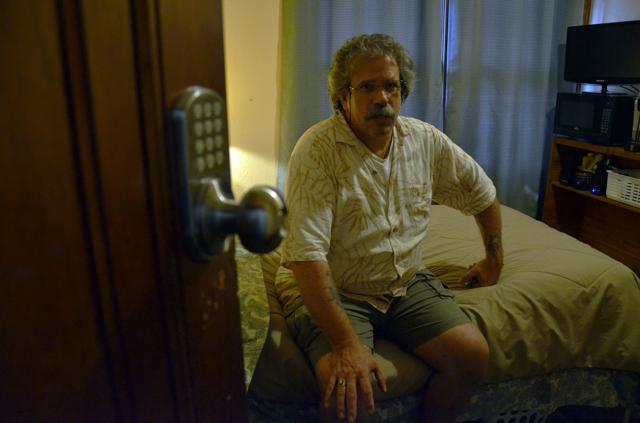The stately two-story brick house at 22 Brucemont Circle blends readily into the quiet West Asheville residential neighborhood; at dusk, women walk the family dog, pushing children in strollers. There is some yard work going on, though: They’ve removed a holly bush to make a place where the guys can park their scooters. That’s because most of the dozen or so men who typically live at the Asheville Recovery Group don’t have a driver’s license anymore, says Gerald Scott Jr.
As house manager, he lives upstairs in the seven-bedroom home, now an addiction-recovery facility. But running the place is not a job, Scott maintains: It’s something he feels he must do, both as a self-proclaimed helper and as a recovering addict.
“There’s a line in the Narcotics Anonymous literature in response to people who say, ‘Once an addict, always an addict.’ It says, ‘The lie is dead: We do recover.’ That’s less true for the people who relapse, but for the people who put their recovery first, that lie is dead because they never have to use again,” says Scott, who’s been sober for 13 years now.
After receiving treatment for his addiction, he spent six months living in a halfway house before moving back to Asheville. Scott’s own struggles to find a supportive, sober environment made him want to create the kind of living situation he knew he and others needed; the challenge was finding a suitable location.
So when Caring for Children put the Brucemont Circle property up for sale earlier this year, Scott and his wife Lydia Scott spoke to the nonprofit about their vision; Caring for Children sold them the home for $288,000. The Asheville Recovery Group is currently seeking 501(c)(3) nonprofit status; the totally self-sufficient program, notes Scott, runs on the rent and fees the residents pay, receiving no government or other funding.
Tricks of the trade
Scott’s primary addiction was Quaaludes, then marijuana and then alcohol. These days, though, the most common addiction he sees is to opiates.
“A lot of guys get addicted to them through pain medicines,” Scott explains. “They learn the doctor-shopping tricks and see three or four different doctors. They also learn how to talk up the right symptoms to get the drugs they want.”
That’s similar to what Dr. Paul Martin observes at the Neil Dobbins Detoxification Center in Asheville. “Over time, we’ve seen the increase in prescription-drug abusers admitted to our facility, and probably a third of our admissions are for prescription opiates,” says Martin, the center’s medical director. That includes narcotic painkillers such as oxycodone, codeine and methadone.
Thieves stole those drugs from two Buncombe County pharmacies this summer, but most addicts don’t have to go to such lengths to get the meds they want, Martin reports.
“An overwhelming majority of prescription drugs obtained by addicts come from family members: They aren’t bought off the streets,” he reveals. “You don’t leave cash lying out on the kitchen table; you put cash away. And it’s the same with prescription drugs. People need to remember to treat them as having potential for abuse when put in the wrong hands.”
Martin says the Asheville-Buncombe Drug Commission, which he chairs, is working to reduce narcotic abuse in Western North Carolina by various means. Preventive measures include advocating the minimum necessary use of such medications, and educating physicians on both how to prescribe properly and how to identify potential substance abusers. Another key piece, he stresses, is having programs in place to treat addicts and help them recover (see box, “Now’s the Time”).
Creating a homelike environment really helps the men working through their recovery, notes Scott. “Somebody’s always coming or going,” he explains; residents may stay anywhere from a few weeks to eight months, and when they leave, Scott says he works with them to find an appropriate new home.
Often, the men find that even small changes can lead to a major shift, notes Scott. “For an addict in recovery, they’re so used to making themselves feel better with little or no concern for how it affects and what it costs other people. So when they start on this change of behavior, quite often in the beginning it’s very frustrating to them.”
Scott understands this all too well. “I spent so many years manipulating the circumstances around me so I could continue to get by,” he explains. “I understand very much all of the manipulations, the avoidance tactics, and I think it helps, because I use some self-disclosure techniques when I’m talking with the guys here. And I’m not shocked by things they tell me, because I’ve been there. I know what it’s like — and I’m here to help them.”
— UNCA senior Caitlin Byrd is new-media editor for The Blue Banner, the campus paper. Send your health-and-wellness news to mxhealth@mountainx.com or news@mountainx.com.




Before you comment
The comments section is here to provide a platform for civil dialogue on the issues we face together as a local community. Xpress is committed to offering this platform for all voices, but when the tone of the discussion gets nasty or strays off topic, we believe many people choose not to participate. Xpress editors are determined to moderate comments to ensure a constructive interchange is maintained. All comments judged not to be in keeping with the spirit of civil discourse will be removed and repeat violators will be banned. See here for our terms of service. Thank you for being part of this effort to promote respectful discussion.